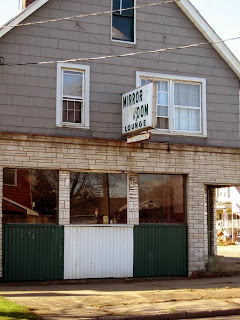War is a dreadful sight to see
When all the boys are sleeping there
They are not sleeping; they are dead.
Some are in their foxholes when they are found.
Some never are found, and the ground is their bed.
My father was, if I remember right, in 7th or 8th grade when he wrote this poem. He would recite it at every opportunity, usually to comic effect. We would be in the car, in the summertime -- cars in our family were generally used, often rusty, and never equipped with air conditioning -- and we'd be blasting down the road, windows open but still sticky and uncomfortable, and people would be a little bit edgy (for that was another crucial facet of our automobile history: the cars were always one seat smaller than our number. Car travel was like a sad game of musical chairs, where the music never stopped and no one was ever "out," the backseat a constant, desperate shuffle for space) and Dad would ask, "Did I ever tell you about my prize-winning poem?" He'd draw himself up, set his jaw, and nobly intone, "War. A Poem By Gerald McMurray. War is a dreadful sight to see..." and we would laugh and listen and things would calm down a little.
There was a time when I loved all things military, loved the history, loved the uniforms and the noble sense of purpose. I had a big Civil War history book, heavy on maps and illustrations, that I carried everywhere, fascinated by the heroic portrait of Admiral Farragut clinging to the riggings and urging his crew to victory at Mobile Bay, haunted by Matthew Brady's photography, lost in the painstakingly drawn maps:
"Damn the torpedoes -- Full Steam Ahead!"
Matthew Brady.
The image doesn't do the maps justice...Trust me, they were amazing.
Vietnam was on television. Young men from our community were fighting (and dying) there, needlessly, shamefully sacrificed. I was too young to understand. I was too young to know that my dad was joking about winning a poetry contest; he wasn't joking about his message. Dad's buddy Norm Keller died in Vietnam -- his name is on that black granite monument in Washington -- and every time he mentioned Normy, Dad would get very solemn and tell us that Norm was a good guy, an athlete, a college guy, and that he'd been killed while trying to give aid to another wounded soldier, that he'd died for his country, that we must not forget him. I remember driving back from Aunt Gladys's house in Sanborn, risking the trip over the creaky, impossibly arched bridge that spanned the railroad tracks and cruising down Townline Road in the twilight, and seeing house after house with blue star pennants hanging in the front windows, not really understanding that every star stood for a boy who was far away from home, hunkered down in some southeast Asian jungle and praying that he'd live to go back home. War was a little boy's game, GI Joes and Civil War picture books, all strategy and uniforms, noble men and noble causes. It was grand and good and not real.
It's different now. Years and experience and a decade of war and I see the weariness, the soul ache in the faces of Brady's subjects. I think about Norm Keller, his life stopped at 24, and of the family he would never have. I think of the waste and wickedness, and the Blue Star parents and the Gold Star parents, and I think that war is a dreadful sight to see.
Unfortunately, war is also a great source of family history information. Death and destruction are usually accompanied by copious amounts of paperwork.
Peter Litwin, Walter Siedlecki, and Alfred McMurray, three young men who probably didn't know one another, but who are eternally linked through me and my posterity, all registered for the 1917-1918 United States draft. None of them, as far as I can tell, were ever drafted, although Walter did eventually enlist with Haller's Blue Army and fought for the Liberation of Poland in the strange years after the German armistice.
Here are their draft cards:
There is a lot of information here.
Alfred is 20; the registrar misspells his middle name as "Hermon," not "Hansen." He works as an electrician, and lives with his mother, Charlotte, at 137 Stenzil Street, close to the intersection of Stenzil and Oliver on the north side of North Tonawanda. That he lists his mother as next of kin implies that his father, James Ocean McMurray, was dead. Al is single.
Walter is also single, a 21 year old laborer at Buffalo Bolt. He was born in Suwalki, "Russia - Poland", his insistence on including Poland as an identifier when the Polish state had not officially exited for decades belies a patriotism that makes understandable his decision to join with Haller's liberation army later that year. He lives at 661 Oliver Street (which for those of you keeping score is the little white building between what used to be Bonk's Deli and what used to be Rudzinski's Hardware), and lists his next of kin as his brother (and my grandfather), Anthony. Anthony would have been six years old in 1918; my guess is that he was the only one in the family who could speak English.
Peter Litwin is still Piotr in 1917. He's married, with two children. He states his intention to become a citizen of the United States, although at this point, after about six years here, he's still a resident alien. He, too, lives in the Avenues and works at the Bolt.
Had a couple of things gone differently -- a draft number comes up, and a kid sitting in a trench in France takes a German bullet or contracts the flu -- our family might never have come to be...
























